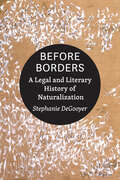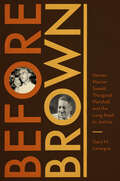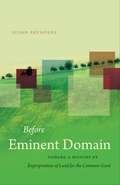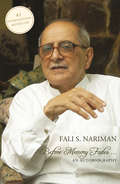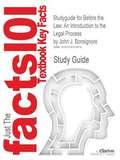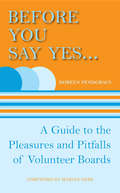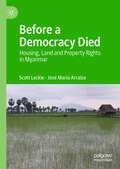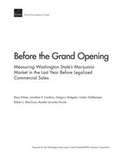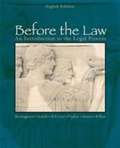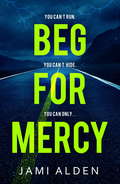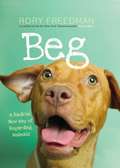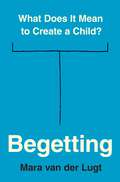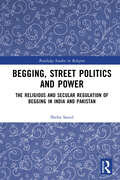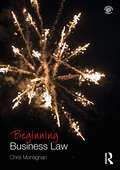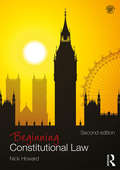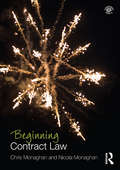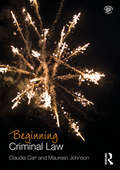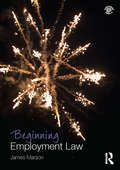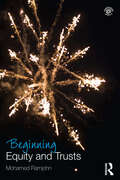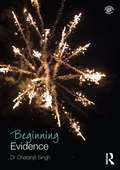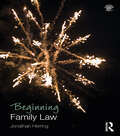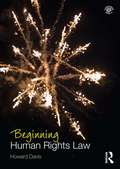- Table View
- List View
Before Borders: A Legal and Literary History of Naturalization
by Stephanie DeGooyerAn ambitious revisionist history of naturalization as a creative mechanism for national expansion.Before borders determined who belonged in a country and who did not, lawyers and judges devised a legal fiction called naturalization to bypass the idea of feudal allegiance and integrate new subjects into their nations. At the same time, writers of prose fiction were attempting to undo centuries of rules about who could—and who could not—be a subject of literature. In Before Borders, Stephanie DeGooyer reconstructs how prose and legal fictions came together in the eighteenth century to dramatically reimagine national belonging through naturalization. The bureaucratic procedure of naturalization today was once a radically fictional way to create new citizens and literary subjects.Through early modern court proceedings, the philosophy of John Locke, and the novels of Daniel Defoe, Laurence Sterne, Maria Edgeworth, and Mary Shelley, DeGooyer follows how naturalization evolved in England against the backdrop of imperial expansion. Political and philosophical proponents of naturalization argued that granting foreigners full political and civil rights would not only attract newcomers but also better attach them to English soil. However, it would take a new literary form—the novel—to fully realize this liberal vision of immigration. Together, these experiments in law and literature laid the groundwork for an alternative vision of subjecthood in England and its territories.Reading eighteenth-century legal and prose fiction, DeGooyer draws attention to an overlooked period of immigration history and compels readers to reconsider the creative potential of naturalization.
Before Brown: Heman Marion Sweatt, Thurgood Marshall, and the Long Road to Justice (Jess and Betty Jo Hay Series)
by Gary M. Lavergne&“Like Texas&’s founding fathers, Sweatt fearlessly faced evil, and made Texas a better place. His story is our story, and Gary Lavergne tells it well.&” –Paul Begala, political contributor, CNN Winner of the Coral Horton Tullis Prize for Best Book of Texas History by the Texas State Historical Association Winner of the Carr P. Collins Award for Best Work of Non-fiction by the Texas Institute of Letters On February 26, 1946, an African American from Houston applied for admission to the University of Texas School of Law. Although he met all of the school&’s academic qualifications, Heman Marion Sweatt was denied admission because he was black. He challenged the university&’s decision in court, and the resulting case, Sweatt v. Painter, went to the U.S. Supreme Court, which ruled in Sweatt&’s favor. In this engrossing, well-researched book, Gary M. Lavergne tells the fascinating story of Heman Sweatt&’s struggle for justice and how it became a milestone for the civil rights movement. He reveals that Sweatt was a central player in a master plan conceived by the National Association for the Advancement of Colored People (NAACP) for ending racial segregation in the United States. Lavergne masterfully describes how the NAACP used the Sweatt case to practically invalidate the &“separate but equal&” doctrine that had undergirded segregated education for decades. He also shows how the Sweatt case advanced the career of Thurgood Marshall, whose advocacy of Sweatt taught him valuable lessons that he used to win the Brown v. Board of Education case in 1954 and ultimately led to his becoming the first black Associate Justice of the Supreme Court.
Before Brown: Heman Marion Sweatt, Thurgood Marshall, and the Long Road to Justice (Jess and Betty Jo Hay Series)
by Gary M. Lavergne&“Like Texas&’s founding fathers, Sweatt fearlessly faced evil, and made Texas a better place. His story is our story, and Gary Lavergne tells it well.&” –Paul Begala, political contributor, CNN Winner of the Coral Horton Tullis Prize for Best Book of Texas History by the Texas State Historical Association Winner of the Carr P. Collins Award for Best Work of Non-fiction by the Texas Institute of Letters On February 26, 1946, an African American from Houston applied for admission to the University of Texas School of Law. Although he met all of the school&’s academic qualifications, Heman Marion Sweatt was denied admission because he was black. He challenged the university&’s decision in court, and the resulting case, Sweatt v. Painter, went to the U.S. Supreme Court, which ruled in Sweatt&’s favor. In this engrossing, well-researched book, Gary M. Lavergne tells the fascinating story of Heman Sweatt&’s struggle for justice and how it became a milestone for the civil rights movement. He reveals that Sweatt was a central player in a master plan conceived by the National Association for the Advancement of Colored People (NAACP) for ending racial segregation in the United States. Lavergne masterfully describes how the NAACP used the Sweatt case to practically invalidate the &“separate but equal&” doctrine that had undergirded segregated education for decades. He also shows how the Sweatt case advanced the career of Thurgood Marshall, whose advocacy of Sweatt taught him valuable lessons that he used to win the Brown v. Board of Education case in 1954 and ultimately led to his becoming the first black Associate Justice of the Supreme Court.
Before Eminent Domain
by Susan ReynoldsIn this concise history of expropriation of land for the common good in Europe and North America from medieval times to 1800, Susan Reynolds contextualizes the history of an important legal doctrine regarding the relationship between government and the institution of private property. Before Eminent Domain concentrates on western Europe and the English colonies in America. As Reynolds argues, expropriation was a common legal practice in many societies in which individuals had rights to land. It was generally accepted that land could be taken from them, with compensation, when the community, however defined, needed it. She cites examples of the practice since the early Middle Ages in England, France, Germany, Italy, and Spain, and from the seventeenth century in America.Reynolds concludes with a discussion of past and present ideas and assumptions about community, individual rights, and individual property that underlie the practice of expropriation but have been largely ignored by historians of both political and legal thought.
Before Memory Fades: An Autobiography
by Fali S. NarimanBefore Memory Fades by Fali S. Nariman is a revelatory, comprehensive and perceptive autobiography – candid, compelling and authoritative.Internationally admired and respected, Fali S. Nariman is a senior advocate of the Supreme Court of India. He began his career at the Bombay High Court in November 1950, and has since been active in the legal profession. Over the years, he has held several prestigious posts at both the national and international levels. He became a Member of Parliament (Rajya Sabha) in November 1999. He is the recipient of the Padma Bhushan (1991) and the Padma Vibhushan (2007). Starting with his formative years, when he had the good fortune to interact with many eminent judges and advocates, Fali S. Nariman moves on to deal with a wide variety of important subjects, such as, the sanctity of the Indian Constitution and attempts to tamper with it. crucial cases that have made a decisive impact on the nation, especially on the interpretation of the law, the relationship between the political class and the judiciary, the cancer of corruption and how to combat this menace, the author outlines measures to restore the now-low credibility of the legal profession, he also delineates his role in several high-profile cases. In recognition of his track record, the Government of India nominated him to the Rajya Sabha. He describes the highlights of his tenure there. Both members of the legal profession and the lay reader will find the contents informative and useful.
Before The Law: An Introduction to the Legal Process
by John J. Bonsignore Stephen Arons Ethan Katsh Peter Derrico Ronald PipkinNever HIGHLIGHT a Book Again Includes all testable terms, concepts, persons, places, and events. Cram101 Just the FACTS101 studyguides gives all of the outlines, highlights, and quizzes for your textbook with optional online comprehensive practice tests. Only Cram101 is Textbook Specific. Accompanies: 9780618503452.
Before You Say Yes ...: A Guide to the Pleasures and Pitfalls of Volunteer Boards
by Doreen PendgracsDoreen Pendgracs has sat on various boards of directors for the past twenty-five years. During that time, she has gleaned valuable information that she shares in an easy-to-understand, conversational style for novices and seasoned members alike. Whether you’re asked to sit on a trade union board, a non-profit board for a community group or church, a business-focused board of an association or chamber of commerce, or the board of a charitable organization, Before You Say Yes … gives you the inside scoop on what questions to ask and what you need to do before you take the plunge. Ms. Pendgracs leads the reader through the intricacies of management style, board etiquette and responsibilities, Robert’s Rules of Order, directors’ and officers’ insurance, and financial obligations and compensation. You’ll also discover what happens in the case of a lawsuit or how to implement a disaster plan, how to welcome new board members and deal with difficult people, and what benefits board membership can bring to your personal life and career.
Before a Democracy Died: Housing, Land and Property Rights in Myanmar
by Scott Leckie José María ArraizaThis volume is a collection of chapters based on work within Myanmar by the authors between 2009 and 2021 while working to improve housing, land and property rights for the population. Despite the extensive application and political uptake of their work throughout the country during the brief democratic reform period of 2011-2021, and measurable progress being made, their work and that of the entire HLP community was brought to a sudden stop following the unexpected military coup in February 2021. Many of those with whom the authors worked closely on various HLP matters are no longer able to work safely on these issues in Myanmar. Others have fled the country and are now refugees, while others continue to face daily persecution and harassment by the military regime. These texts will be of great interest to scholars and activists in the region.
Before the Best Interests of the Child
by Joseph Goldstein Albert J. Solnit Anna FreundA lawyer and two child psychologists conclude which circumstances are reasonable grounds for the state intervening between parent and child
Before the Grand Opening: Measuring Washington State's Marijuana Market in the Last Year Before Legalized Commercial Sales
by Robert J. Maccoun Beau Kilmer Rosalie Liccardo Pacula Jonathan P. Caulkins Gregory Midgette Linden DahlkemperBefore the Grand Opening: Measuring Washington State's Marijuana Market in the Last Year Before Legalized Commercial Sales
Before the Law: An Introduction to the Legal Process
by Stephen Arons Ronald M. Pipkin Ethan Katsh John Bonsignore Peter D'ErricoBefore the Law promotes an interdisciplinary approach for introducing students to the purpose and practice of law in our society. Excerpts from recent and classic court cases, as well as material on trends in legal studies come from a range of legal sources, including court opinions; sociological, psychological, and anthropological analyses; historical and philosophical approaches; and literary reflections. Readings cover such current topics as online dispute resolution and protection of personal and property rights in cyberspace; gay marriage; and post-9/11 legislation for fighting terrorism.
Before the Law: The Complete Text of Préjugés (Univocal)
by Jacques DerridaThinking judgment in relation to the work of Jean-François Lyotard &“How to judge—Jean-François Lyotard?&” It is from this initial question that one of France&’s most heralded philosophers of the twentieth century begins his essay on the origin of the law, of judgment, and the work of his colleague Jean-François Lyotard. If Jacques Derrida begins with the term préjugés, it is in part because of its impossibility to be rendered properly in other languages and also contain all its meanings: to pre-judge, to judge before judging, to hold prejudices, to know &“how to judge,&” and more still, to be already prejudged oneself. Striving to contain that which comes before the law, that is in front of the law and also prior to it, how to judge Jean-François Lyotard then becomes perhaps a beneficial attempt for Derrida to explore humanity&’s rapport with judgment, origins, and naming. For how does one come to judge the author of the Differend? How does one abstain from judgment to accept the term préjugés as suspending judgment and at once as taking into account the impossibility of speaking before the law, prior to naming or judging? If this task indeed seems insurmountable, it is the site where Lyotard&’s work itself is played out. Hence this sincere and intriguing essay presented by Jacques Derrida, published here for the first time in English.
Beg For Mercy: Dead Wrong Book 1 (Dead Wrong)
by Jami AldenJami Alden's Beg For Mercy is a sizzling, suspenseful tale, perfect for fans of Melinda Leigh, Kendra Elliot, Karen Rose and Laura Griffin.Megan Flynn thought she was falling in love with Cole Williams. That is until he arrested her brother - the only family she has left - for a murder she knows he couldn't have possibly committed. Now, with her heart broken and her brother's life hanging in the balance, Megan will risk everything to prove his innocence. Even if that means throwing herself into the path of a sadistic killer with a hauntingly familiar MO. When she insinuates herself into the most shockingly brutal case Cole has ever worked, he can't stand idly by. Plunged into a secret world where the city's elite indulge their darkest desires, Cole will do whatever it takes save the woman he loves and bring down the madman who has made Megan his most coveted prey.Don't miss more edge-of-the-seat suspense from Jami Alden with her sexy, thrilling novels Hide From Evil, Run From Fear and Guilty As Sin.
Beg: A Radical New Way of Regarding Animals
by Rory FreedmanRory Freedman explains her profound love for her dogs and encourages the world to embrace the importance of pets.
Begetting: What Does It Mean to Create a Child?
by Mara van der LugtAn investigation of what it means to have children—morally, philosophically and emotionally&“Do you want to have children?&” is a question we routinely ask each other. But what does it mean to create a child? Is this decision always justified? Does anyone really have the moral right to create another person? In Begetting, Mara van der Lugt attempts to fill in the moral background of procreation. Drawing on both philosophy and popular culture, van der Lugt does not provide a definitive answer on the morality of having a child; instead, she helps us find the right questions to ask.Most of the time, when we talk about whether to have children, what we are really talking about is whether we want to have children. Van der Lugt shows why this is not enough. To consider having children, she argues, is to interrogate our own responsibility and commitments, morally and philosophically and also personally. What does it mean to bring a new creature into the world, to decide to perform an act of creation? What does it mean to make the decision that life is worth living on behalf of a person who cannot be consulted? These questions are part of a conversation we should have started long ago. Van der Lugt does not ignore the problematic aspects of procreation—ethical, environmental and otherwise. But she also acknowledges the depth and complexity of the intensely human desire to have a child of our own blood and our own making.
Begging, Street Politics and Power: The Religious and Secular Regulation of Begging in India and Pakistan (Routledge Studies in Religion)
by Sheba SaeedBegging, Street Politics and Power explores the complex phenomenon of begging in the context of two different religions and societies in South Asia. Focusing on India and Pakistan, the book provides an in-depth examination of the religious and secular laws regulating begging along with discussion of the power dynamics involved. Drawing on textual analysis and qualitative field research, the chapters consider the notion of charity within Hinduism and Islam, the transaction of giving and receiving, and the political structures at play in the locations studied. The book engages with the conflicting compassionate and criminal sides of begging and reveals some of the commonalities and differences in religion and society within South Asia. It will be of interest to scholars working across the fields of religious studies, social science, law and Asian studies.
Beginning Business Law (Beginning the Law)
by Chris MonaghanWhether you’re new to higher education, coming to legal study for the first time or just wondering what Business Law is all about, Beginning Business Law is the ideal introduction to help you hit the ground running. Starting with the basics and an overview of each topic, it will help you come to terms with the structure, themes and issues of the subject so that you can begin your Business Law module with confidence. Adopting a clear and simple approach with legal vocabulary explained in a detailed glossary, Chris Monaghan breaks the subject of Business Law down using practical everyday examples to make it understandable for anyone, whatever their background. Diagrams and flowcharts simplify complex issues, important cases are identified and explained and on-the- spot questions help you recognise potential issues or debates within the law so that you can contribute in classes with confidence. Beginning Business Law is an ideal first introduction to the subject for LLB, GDL or ILEX and especially international students, those enrolled on distance learning courses or on other degree programmes.
Beginning Constitutional Law (Beginning the Law)
by Nick HowardWhether you’re new to higher education, coming to legal study for the first time or just wondering what Constitutional Law is all about, Beginning Constitutional Law is the ideal introduction to help you hit the ground running. Adopting a clear and simple approach with legal vocabulary explained in a detailed glossary avaliable on the companion website, Nick Howard breaks the subject of constitutional law down using practical everyday examples to make it understandable for anyone, whatever their background. Diagrams and flowcharts simplify complex issues, important cases are identified and explained, and on-the- spot questions help you recognise potential issues or debates within the law so that you can contribute in classes with confidence. This second edition has been updated to keep up to date with developments both before and after the 2015 General Election as well as ongoing proposals for reform, including: • The referendum on independence for Scotland, increased devolved powers and the continued threat of the break-up of the Union. • Proposals to repeal the Human Rights Act 1998 and replace it with a British Bill of Rights. • The in/out referendum on EU membership. • Reform of the role and composition of the House of Lords. Beginning Constitutional Law is an ideal first introduction to the subject for LLB, GDL or ILEX and especially international students, those enrolled on distance learning courses or on other degree programmes.
Beginning Contract Law (Beginning the Law)
by Nicola Monaghan Chris MonaghanWhether you’re new to higher education, coming to legal study for the first time or just wondering what Contract Law is all about, Beginning Contract Law is the ideal introduction to help you hit the ground running. Starting with the basics and an overview of each topic, it will help you come to terms with the structure, themes and issues of the subject so that you can begin your Contract Law module with confidence. Adopting a clear and simple approach with legal vocabulary explained in a detailed glossary, Chris and Nicola Monaghan break the subject of Contract law down using practical everyday examples to make it understandable for anyone, whatever their background. Diagrams and flowcharts simplify complex issues, important cases are identified and explained and on-the- spot questions help you recognise potential issues or debates within the law so that you can contribute in classes with confidence. Beginning Contract Law is an ideal first introduction to the subject for LLB, GDL or ILEX and especially international students, those enrolled on distance learning courses or on other degree programmes.
Beginning Criminal Law (Beginning the Law)
by Maureen Johnson Claudia CarrWhether you’re new to higher education, coming to legal study for the first time or just wondering what Criminal Law is all about, Beginning Criminal Law is the ideal introduction to help you hit the ground running. Starting with the basics and an overview of each topic, it will help you come to terms with the structure, themes and issues of the subject so that you can begin your Criminal Law module with confidence. Adopting a clear and simple approach with legal vocabulary explained in a detailed glossary, Claudia Carr and Maureen Johnson break the subject of criminal law down using practical everyday examples to make it understandable for anyone, whatever their background. Diagrams and flowcharts simplify complex issues, important cases are identified and explained and on-the- spot questions help you recognise potential issues or debates within the law so that you can contribute in classes with confidence. Beginning Criminal Law is an ideal first introduction to the subject for LLB, GDL or ILEX and especially international students, those enrolled on distance learning courses or on other degree programmes.
Beginning Employment Law (Beginning the Law)
by James MarsonWhether you’re new to higher education, coming to legal study for the first time or just wondering what Employment Law is all about, Beginning Employment Law is the ideal introduction to help you hit the ground running. Starting with the basics and an overview of each topic, it will help you come to terms with the structure, themes and issues of the subject so that you can begin your Employment Law module with confidence. Adopting a clear and simple approach with legal vocabulary explained in a detailed glossary, James Marson breaks the subject of Employment Law down using practical everyday examples to make it understandable for anyone, whatever their background. Diagrams and flowcharts simplify complex issues, important cases are identified and explained and on-the- spot questions help you recognise potential issues or debates within the law so that you can contribute in classes with confidence. Beginning Employment Law is an ideal first introduction to the subject for LLB, GDL or ILEX and especially international students, those enrolled on distance learning courses or on other degree programmes.
Beginning Equity and Trusts (Beginning the Law)
by Mohamed RamjohnWhether you’re new to higher education, coming to legal study for the first time or just wondering what Equity and Trusts is all about, Beginning Equity and Trusts is the ideal introduction to help you hit the ground running. Starting with the basics and an overview of each topic, it will help you come to terms with the structure, themes and issues of the subject so that you can begin your Equity and Trusts module with confidence. Adopting a clear and simple approach with legal vocabulary explained in a detailed glossary, Mohamed Ramjohn breaks the subject of Equity and Trusts down using practical everyday examples to make it understandable for anyone, whatever their background. Diagrams and flowcharts simplify complex issues, important cases are identified and explained and on-the- spot questions help you recognise potential issues or debates within the law so that you can contribute in classes with confidence. Beginning Equity and Trusts is an ideal first introduction to the subject for LLB, GDL or ILEX and especially international students, those enrolled on distance learning courses or on other degree programmes.
Beginning Evidence (Beginning the Law)
by Charanjit SinghWhether you’re new to higher education, coming to legal study for the first time or just wondering what Evidence Law is all about, Beginning Evidence is the ideal introduction to help you hit the ground running. Starting with the basics and an overview of each topic, it will help you come to terms with the structure, themes and issues of the subject so that you can begin your evidence module with confidence. Adopting a clear and simple approach with legal vocabulary explained in a detailed glossary, Charanjit Singh Landa breaks the subject of Evidence Law down using practical everyday examples to make it understandable for anyone, whatever their background. Diagrams and flowcharts simplify complex issues, important cases are identified and explained and on-the- spot questions help you recognise potential issues or debates within the law so that you can contribute in classes with confidence. Beginning Evidence is an ideal first introduction to the subject for LLB, GDL or ILEX and especially international students, those enrolled on distance learning courses or on other degree programmes.
Beginning Family Law (Beginning the Law)
by Jonathan HerringWhether you’re new to higher education, coming to legal study for the first time or just wondering what Family Law is all about, Beginning Family Law is the ideal introduction to help you hit the ground running. Starting with the basics and an overview of each topic, it will help you come to terms with the structure, themes and issues of the subject so that you can begin your Family Law module with confidence. Adopting a clear and simple approach with legal vocabulary carefully clarified, Jonathan Herring breaks the subject of family law down using practical everyday examples to make it understandable for anyone, whatever their background. Diagrams and flowcharts simplify complex issues, important cases are identified and explained and on-the- spot questions help you recognise potential issues or debates within the law so that you can contribute in classes with confidence. Beginning Family Law is an ideal first introduction to the subject for LLB, GDL or ILEX and especially international students, those enrolled on distance learning courses or on other degree programmes. Visit the companion website: http://www.routledge.com/cw/beginningthelaw/
Beginning Human Rights Law (Beginning the Law)
by Howard DavisWhether you’re new to higher education, coming to legal study for the first time or just wondering what Human Rights Law is all about, Beginning Human Rights Law is the ideal introduction to help you hit the ground running. Starting with the basics and an overview of each topic, it will help you come to terms with the structure, themes and issues of the subject so that you can begin your Human Rights module with confidence. Adopting a clear and simple approach with legal vocabulary explained in a detailed glossary, Howard Davis breaks the subject of Human Rights Law down using practical everyday examples to make it understandable for anyone, whatever their background. Diagrams and flowcharts simplify complex issues, important cases are identified and explained and on-the- spot questions help you recognise potential issues or debates within the law so that you can contribute in classes with confidence. Beginning Human Rights Law is an ideal first introduction to the subject for LLB, GDL or ILEX and especially international students, those enrolled on distance learning courses or on other degree programmes.
